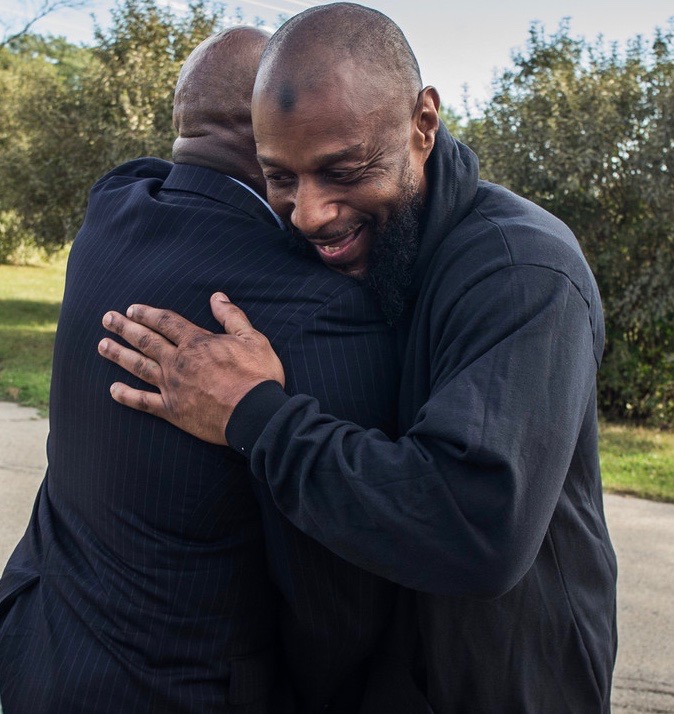 Mark Maxon (Zbigniew Bzdak / Chicago Tribune)
On the evening of August 30, detectives began questioning 31-year-old Mark Maxson, a neighborhood resident and handyman, after Maxson told reporters that around 10:30 p.m. on the night of August 29, he bought the boy a bag of potato chips at a liquor store and told him to go home.
Four days later, on September 2, 1992, detectives said Maxson had given a confession transcribed by a court reporter during which he admitted that he went to the garage and ingested cocaine. The boy followed him and when he resisted performing a sex act with Maxson, he was stabbed to death and raped. Maxson was charged with first-degree murder and aggravated criminal sexual assault. The state sought the death penalty.
Prior to trial, Maxson moved to suppress the confession, which he had not signed.
Maxson testified at the hearing that he answered questions from the detectives and took a polygraph examination, which the detectives told him he had failed. After three days, he asked for a lawyer but they denied his request. When he asked how he could confess to a crime he did not commit, the detectives accused him of being uncooperative. After the detectives slapped him in the face, kicked him in the ribs and fed him information about the crime, he falsely confessed.
The detectives denied Maxson was physically abused or that he asked for a lawyer. They testified that he was not under arrest and was free to leave the station at any time.
The motion to suppress the confession was denied and Maxson went to trial in Cook County Circuit Court in March 1994. The detectives testified that the interrogation was not coercive or abusive, and the jury heard the court-reported confession.
According to the statement, Maxson purchased a bag of cocaine and was walking to a friend’s house when he saw Murdock and told him it was late for him to be outside. The boy asked him if he had any change so that he could buy a bag of chips. Maxson said he went to the Fortenberry's Liquor Store on 111th Street and bought the boy some chips. Both of them then left the store and walked toward State Street.
In the statement, Maxson said the boy said he was running away, but that he told the boy to go home and face his parents. The boy went north on State Street and Maxson, instead of going to his friend’s house, went to the abandoned garage and smoked the cocaine. He said the boy then appeared and startled him. Maxson said that he told the boy to engage in oral sex, but the boy refused, so he attempted to force the boy and then struck him. The boy then began performing sex on Maxson, but almost immediately fainted.
According to the statement, Maxson raped the boy and took him to the side of the garage. Maxson realized he was dead after poking him with a stick and some glass. Maxson then hid the body under some debris and left the garage.
A crime laboratory analyst testified that some blood found on the victim’s clothing was neither the victim’s nor Maxson’s. A hair analyst testified that hair had been recovered at the scene, but testing excluded both Maxson and the boy as the source of the hair.
On March 24, 1994, the jury convicted Maxson of first-degree murder and aggravated sexual assault, but declined to impose the death penalty. Maxson was sentenced to life in prison without parole.
Maxson’s conviction was upheld by the Illinois Court of Appeals. He filed a federal petition for a writ of habeas corpus, but it was denied.
In 2015, lawyers for Maxson filed a motion seeking DNA testing of the crime scene evidence. In May 2016, the Illinois State Police Department of Forensic Science reported that testing on the victim’s underwear, pants, shirt and a quilt found at the scene identified a male DNA profile that did not match Maxson.
The Cook County State’s Attorney’s Office Conviction Integrity Unit, which had agreed to the DNA testing, reinvestigated the case. It determined that the DNA profile found on the clothing came from Wade Osborne, who had pled guilty to stabbing his uncle to death in November 1994.
Osborne had been released after serving 22 years in prison for the murder, but was arrested on a charge of failing to register as a convicted murderer in May 2016. While in custody, he gave a videotaped confession to FBI agents and Illinois state police officers admitting that he took the boy to the garage to molest him and wound up stabbing him to death.
Osborne also wrote letters to family members of the victim, apologizing for killing the boy.
On September 27, 2016, Osborne was charged with the boy’s rape and murder. At the same time, Maxson’s convictions were vacated, the prosecution dismissed the charges, and he was released from prison.
Maxson then filed a federal civil rights lawsuit against the city of Chicago seeking $54 million in damages. in October 2016, Maxson was granted a certificate of innocence. He was subsequently awarded $220,700 in state compensation.
– Maurice Possley
|